St Vincent de Paul: Biography
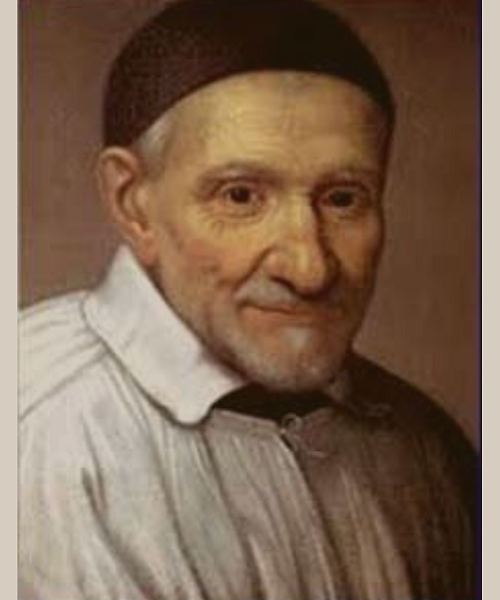
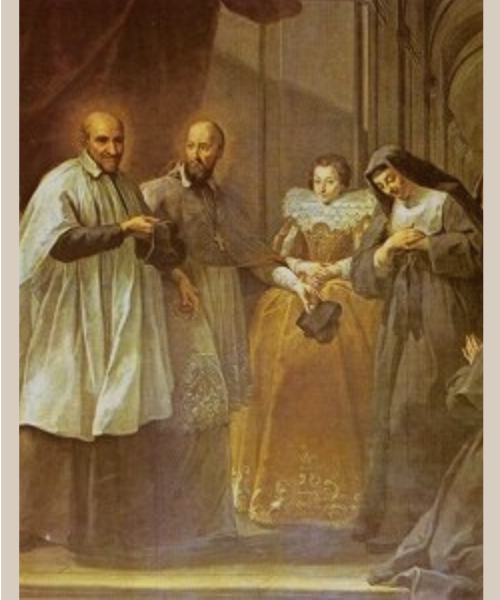
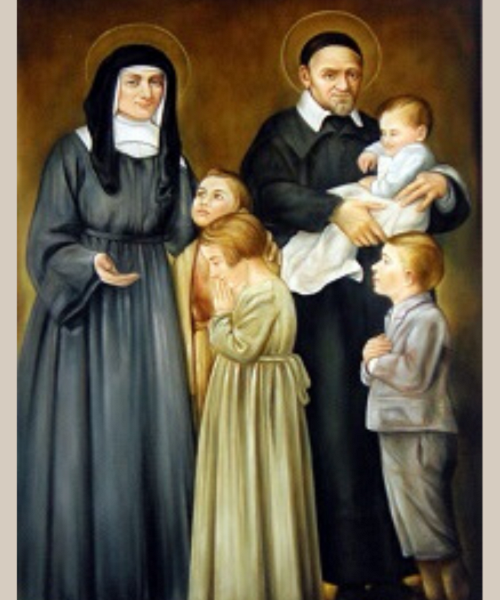
The third of six children of Jean and Bertrande de Moras, Vincent was born in April 1581 in Pouy, a village near Dax in Gascony, in the southwest of France.
The farming origins of the boy soon led him to the care of the family pigs and cows, until the parents becoming aware of his intellectual capacities, decided to make him study in 1595, entrusting him to the Franciscans of the nearby Convent of Dax.
Vincent studied with the Franciscans for only a few months, possibly because on the recommendation of the friars, he earned the unexpected interest of a patron, Mr. de Comet, a lawyer from Dax and a judge of Pouy. He welcomed him home as a tutor of his children and convinced him to undertake ecclesiastical studies. He received the tonsure and minor orders in 1596, he studied theology at Toulouse and in 1600, before finishing his studies, was ordained priest.
That same year, he looked in his diocese for an ecclesiastic benefit. With the support of Mr. de Comet he was appointed parish priest of Tilh by the vicar general, but had to abandon it and devote himself only to study because the same appointment was already in possession of another priest who disputed the legitimacy of that benefit. In 1604 he concluded his studies with a Bachelor degree.
The period from 1605 to 1607, is the most discussed of the biography of the Saint. A dark period in which there is no trace. He went to Marseilles to collect the inheritance of a will in his favour, but on his return to Toulouse, the boat on which he was travelling was attacked by Turkish Corsairs and Vincent recounts that he was taken prisoner and sold as a slave. Back in France, he went to Paris in search of a benefit, essential for his economic stability. From the French capital in 1610, he wrote to his mother of his struggles and his plans hoping still to “retire honourably”.
In this context of projects, ambitions, dreams and disappointments, some incidents and characters enter the life of the Saint with great effect on his “conversion”. In 1609 during his stay in Paris, Vincent lived one of the most bitter humiliations of his life – being accused of theft – to which he reacted, contrary to what one might expect, with great virtue and humility. On that occasion he met Pierre de Bérulle, a leading man in the French spirituality of that time. After a few years Vincent chose him as his spiritual director. In the Court of Queen Margaret, Vincent met a doctor in theology who was experiencing great doubts in the faith to the point of wanting to commit suicide. Vincent calmed him down and at the same time, offered himself to God asking him to experience in his own soul the tribulations of the theologian. The theologian regained his faith in God, but Vincent fell in the whirlwind of a profound spiritual crisis that lasted approximately four years.
He came out of it only when, following the impulses of grace, he made the decision to devote his life to the service of the poor, for the love of Jesus Christ. In 1612 Bérulle, being in need of a curate for the parish of Clichy, on the outskirts of Paris, proposed the appointment to Vincent who accepted with great enthusiasm. He took possession of the parish on 2nd May of the same year. He preached with enthusiasm and persuasion, visited the sick, the afflicted, the poor.
In 1613 the Bérulle invited him to leave Clichy to become a tutor, in one of the most illustrious families of France: the Gondi family – a family of bankers from Florence, who had made their fortune with Catherine dei Medici. Vincent accepted the new post while maintaining the parish of Clichy until 1626. As a token of gratitude for his spiritual favours and, now certain of his abilities, the Gondi nominated Vincent Chaplain of their fiefs. Finally his much desired for dream is achieved: an ecclesiastical office at the French nobility which ensures a comfortable life without problems. But Vincent has changed.
In January of 1617 during a visit to Folleville, he was called to the bedside of a farmer of the nearby village of Gannes. He encouraged him to make a general confession. The outcome was unexpected. The farmer began to confess very serious failings, never disclosed in previous confessions. After the confession, that poor man felt liberated from all guilt that had accompanied him until then and was invaded by an overwhelming joy. On 25th January, a few days after that confession, on the feast of the conversion of Saint Paul, Vincent held a sermon in which he taught how to make the General confession. It was a Tuesday, but there were a lot of people who came to Vincent though he could not hear the confession of all. The Jesuits of Amiens were called to help. This was a sign that the sermon had really touched those souls. For Vincent it was a revelation. He felt that this was his mission, the work that God wanted from him: to bring the Gospel to the poor people of the countryside. Eight years later he founded the Congregation of the Mission with this specific charism and always considered January 25th, 1617 as the Company’s Foundation day and the sermon preached on that day as “the first sermon of the mission”.
As his apostolic zeal grew, his discomfort as tutor of the difficult children of family Gondi also increased: his spiritual father, Bérulle, entrusted to him the pastoral care of the parish of Châtillon les Dombes (today Chátillon sur Chalaronne), a town near Lyon which had recently passed to France and strongly resented the Calvinist influence in nearby Geneva. He departed immediately, without even informing the Gondi of his new intentions. It was lent of 1617. He moved quickly in his parish. The founding experience of the Company of Charity took place in this parish on August 20th, 1617.
On the insistence of the family Gondi, he returns to their house on 23rd December 1617, no longer as a tutor but simply as chaplain of their possessions. He was decided to devote himself entirely to the salvation of poor people through preaching and evangelisation. Since then, Vincent never missed an opportunity to instill the importance of the practice of charity to all the people who went to him for spiritual direction and he continuously committed himself in establishing the “Charity” and everywhere preached the parish Missions.
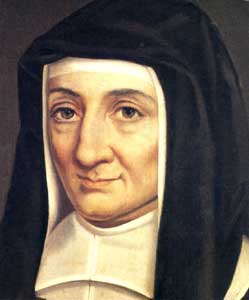
St Luisa di Marillac
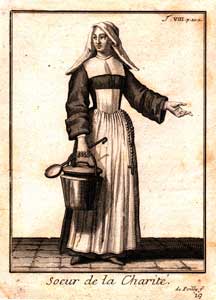
A daughter of Charity
In a short time, the confraternities reached the large French cities. Numerous ladies joined these confraternities and everywhere there was always a positive feedback from bishops and priests on one hand, and from officers and municipal authorities on the other. In 1629 the Confraternities of Charity reached Paris and within a few years there wasn’t a parish in the capital that didn’t have one, engaged with the foundlings, prisoners, galley slaves, beggars. However because the ladies “are mostly of noble birth that does not allow them to perform the low and mean chores necessary in the exercise of charity,” Vincent founded the Daughters of Charity (1633).
Their way of life, was similar to that of female religious communities but their charism was linked to a whole new concept of feminine consecrated life. It avoided every distinctive canonical sign that could qualify them as religious: no longer “nuns”, “women living alone” but “sisters”, sisters of all, open to the needs of others, not only spiritually, but in the practical needs of everyday life, travel companions of the most wretched, a constant incentive towards solidarity and fraternity and in search of the essential things that enable people to be neighbours to one another.
With the year 1633 the life of Vincent had a turn, the third. He was 53 years old and by now the time of ambition was history. Vincent collaborated in the monastic reform. In 1633, he instituted the “conferences of Tuesday” for the betterment of the clergy. At the death of Louis XIII in 1643, when Queen Anne of Austria passed on to the power of France, he was appointed a member of the Council of Conscience. In this last third part of his life, the story of Vincent becomes a part of the history of the universal Church and of the history of France. His life is intertwined with the story of postwar France: in 1632 the invasion of Lorena, in 1649 the war of the Fronde.
The Congregation of the mission expands more and more (in 1660 it was composed of 426 priests and 196 brothers): in 1636 the missionaries take care of the Paris seminaries, they spread all over the world (Italy in1642, Tunis in1645, Algiers and Ireland in 1646, Madagascar in 1648, Poland in 1651), preaching parish missions in a continuous rhythm (between 1625 and 1632 about 140 missions, from 1642 to 1660, only in the House of St. Lazarus about 700).
The Daughters of Charity were required everywhere: schools, hospitals, parish … The Ladies of Charity no longer limit themselves only to visiting the sick: they take care of the wounded during the war, of the galley slaves, of the beggars … Many were the categories of the poor with whom he was involved first through direct commitment, and then, through the works that the Lord had, through him, wanted to accomplish.
Despite such a hectic rhythm, he was not a tense or irritating person. Although he was gifted with the genius of organization, what is striking is not so much the method as the spirit of his work. He was conscious of doing God’s work. The internal consistency of his thought and action is born from the unity of charity and Gospel. He had discovered that he was searched by God, reached by Him. He felt loved and wanted to love. His zeal, his passion for souls were solely an expression of his love for God.
Vincent dies on the 27th 1660. His last words were: “Jesus”. He was dressed, sitting on a chair near the fire … as if he were waiting for someone.
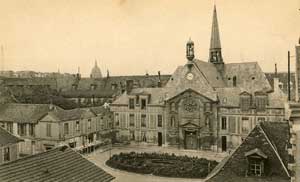
Paris: hospital Laënnec where Jeanne-Antide worked
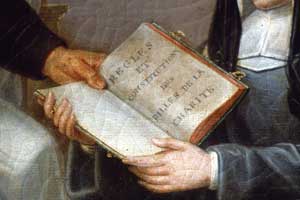
The book of the Constitutions of the Daughters of Charity

